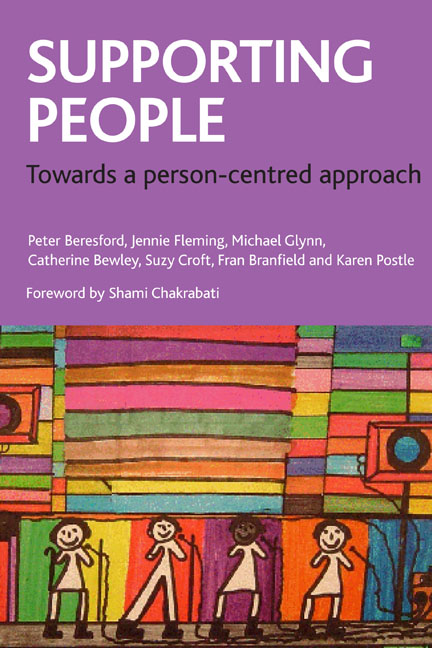Book contents
- Frontmatter
- Dedication
- Contents
- About the authors
- Acknowledgements
- Foreword
- Introduction
- Part One The Background to Person-Centred Support
- Part Two Person-Centred Support: Barriers and Ways of Overcoming Them
- Part Three Broader Issues for Person-Centred Support
- Part Four Making Change to Achieve Person-Centred Support
Foreword
Published online by Cambridge University Press: 01 September 2022
- Frontmatter
- Dedication
- Contents
- About the authors
- Acknowledgements
- Foreword
- Introduction
- Part One The Background to Person-Centred Support
- Part Two Person-Centred Support: Barriers and Ways of Overcoming Them
- Part Three Broader Issues for Person-Centred Support
- Part Four Making Change to Achieve Person-Centred Support
Summary
We all, most likely, will need social care for ourselves or loved ones at some point in our lives. It may be home help for an elderly relative or assistance for a friend or family member with mental health problems. Regardless of the circumstances, we would hope that our loved ones (or indeed ourselves) would be treated with decency and dignity – in essence, as a human being – by care professionals we come in contact with.
The way in which we view and treat marginalised people is surely a measure of a civilised society, and the basis of a just society is that the human rights values of dignity, equality and fairness must be extended to everyone. The right to humane treatment is one of our very fundamental, inalienable and unqualified rights. However, it is often those pushed to the margins of society – mental health service users, disabled, homeless and older people and those living with addiction – who are most vulnerable to having their basic rights neglected, and their voices unheard. Most care providers do an outstanding job under difficult circumstances but we have all shuddered at stories of ill treatment of vulnerable people by the very people charged with looking after their well being. One case of ill treatment by a carer of a vulnerable person is one too many.
Supporting people: Towards a person-centred approach promotes a care system that is individual focused rather than target driven, and unapologetically widens the debate around the provision of social care, its means and its ends. It challenges the dominant orthodoxy in academic and practical circles, and advocates a rights-based, personalised approach to care and support that would put the needs, choices and rights of the recipient at the heart of their care package. It challenges policymakers and practitioners to take a closer look at how we treat and care for some of the most vulnerable and marginalised members of our society. It strongly argues against the institutionalisation and categorisation of people in need of social care and urges that carers must always consider the right to privacy and family life, the right to liberty, to freedom from discrimination, to freedom of thought, religion and belief.
- Type
- Chapter
- Information
- Supporting PeopleTowards a Person-Centred Approach, pp. viii - ixPublisher: Bristol University PressPrint publication year: 2011

